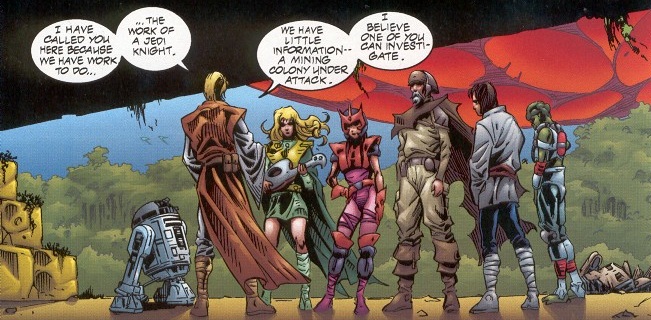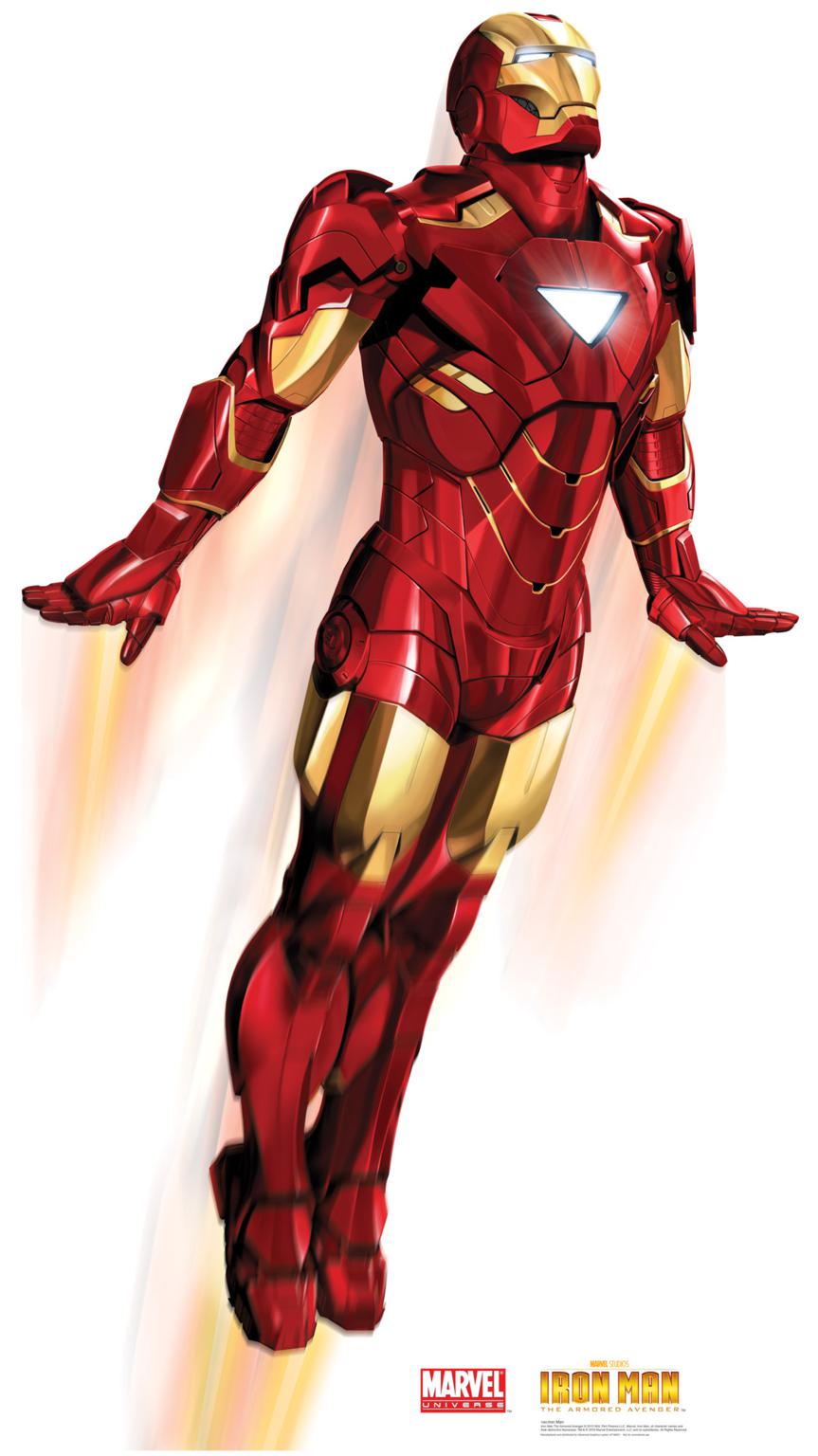
With Captain America: The Winter Soldier coming out tomorrow (in America, the nation that is in the name of the damn movie yet somehow getting it last), it’s timely to address Star Wars’ relationship with the superhero genre. Thanks to the Jedi’s powers and its expansive continuity, it has more than a little in common with superhero universes, but less has been done with those similarities than you might think.
The superhero genre, long restricted primarily to primacy in comics but now becoming the dominant form of movie blockbuster as well, is best understood as stories about outstanding heroes endowed with superhuman or unrealistically optimal abilities who make careers of fighting evil under a distinct identity. The tropes of the genre — secret identities, costumes, supervillain rogue’s galleries, superhero teams, origin stories, interlocking shared universes, fuzzy continuity, sliding timelines, temporary deaths — should be familiar to most of the general public, let alone the geek community.
Star Wars lacks a lot of those tropes. Its heroes operate in the open, not hidden behind masks and nicknames. They tend to face villains sequentially and beat them, rather than constantly matching wits against the same pool of bad guys. Star Wars’ continuity is, in principle and usually in practice, sharp and its timeline immobile, its deaths mostly permanent. But there are similarities worth noting.
Most obvious are the Jedi, who may not wear colorful spandex, but fit the core criteria of being superpowered heroes dedicated to fighting evil. In the cinematic stories of Luke and Anakin Skywalker, one can even see the origin-story echoes of a young man discovering his hidden powers and learning how to use them to fight the forces of darkness.

Relatively little of the Expanded Universe, however, shows writers conceptualizing the Jedi as superheroes. Kevin J. Anderson seems to have had superheroes in mind when he gave Luke’s Jedi students power specializations. In constructing a team of complementary specialists, Anderson appears to have modeled his Jedi Order on the mutants of the X-Men as much as the example of Luke, Obi-Wan, and Yoda. One can also perhaps detect a trace of superhero thinking in the post-New Jedi Order books, in which the Jedi are treated essentially as a reactive band of omnipowerful warriors who sit around waiting to respond to the revelation of supervillain plots, and non-powered characters are treated as minor sidekicks in a story that inherently has to revolve around a clash of superpowered heroes and villains. Kerra Holt in Knight Errant was a single Jedi taking on a recurring rogue’s gallery of villains. In general, however, Star Wars stories don’t appear particularly informed by the standalone heroes with distinct identities, specialized power sets, and recurring villains of superhero fiction.
While costumes and nicknames are unnecessary, I think there are some things that could be learned. Giving Jedi heroes a more distinct identity, along the lines of superheroes, and featuring them as singular heroes could be of great benefit. By isolating a character and helping build a setting, personality, and role around them, the character becomes more strongly defined. Corran Horn’s undercover adventures as the “Ghost Jedi” lurking among the Invid pirates — pirate by day, secret do-gooder by night, complete with a helpful butler — are a good example of the way the isolated Jedi with a strong identity on a distinct crimefighting mission can work.
Specialized powers can be an important part of creating that distinct identity — as in Corran’s lack of telekinesis and talent for illusion and energy absorption — and are also of benefit in making Jedi more diverse and unique in general. When each Jedi has a special talent — the healer, the pilot, the swordsman, the illusionist, the mind-reader — those Jedi can each develop their own well-defined role within the overall cast and the story, a step up from making all Jedi interchangeable and thus more generic.

Recurring villains could really benefit the Expanded Universe. We see them most in the film eras, where everybody wants to use Darth Vader and Boba Fett and the characters obviously can’t die or be defeated for good. The Clone Wars are an especially strong example, with multiple villains such as Dooku, Grievous, Asajj Ventress, Durge, Cad Bane, and Sora Bulq created who persisted throughout the war and returned time and time again to bedevil the heroes. Outside those eras, however, villains tend to be set up and then knocked down within the course of one work or series. Admiral Daala and Alema Rar are among the only villains to appear in more than one series, though within longer series like The New Jedi Order and X-wing, villains like Ysanne Isard, Nom Anor, and Tsavong Lah have reaped the benefits of recurrence.
Those benefits are the ability of a recurring villain to receive more than usual character development, to become an important part of the setting and build a rivalry with the heroes to greater and greater heights, increasing the stakes. Certainly not every villain should be recurring, but having a few familiar standbys in each era against whom the characters can match wits — characters on the level of Boba Fett or Alema Rar, secondary villains who can move in and out of stories and escape without denying the overall stories closure — could be of great benefit in helping flesh those eras out. For all that Troy Denning has done wrong, positioning Vestara in that role for the post-Fate of the Jedi era is a decision with promise.

Though I’ve talked mostly about Jedi so far, they are not the only characters to whom superhero comparisons can apply. The main sources for superpowers, in superhero fiction, tend to be magic, space aliens, pseudoscience, and advanced technology. The Force covers the magic aspect, but Star Wars also abounds in aliens, pseudoscience, and advanced technology. The failure to take advantage of these opportunities is glaring when considered. Even in a galaxy in which most alien species end up as flavored humans, there are still plenty of species that share what would be superpowers in comics — superhuman strength, amphibiousness, flight, telepathy — and it makes sense that there would be even more. Yet Star Wars stories tend not to do much with the fact that galactic society is full of ordinary people with “superhuman” abilities. Similarly, the state of galactic technology means there’s little reason someone out there shouldn’t be able to build an Iron Man suit and contend with the Jedi, and cybernetics and other advanced technologies hold out the possibility of radically “improved” beings. To some extent Star Wars is right to deemphasize this, lest the setting spiral out of hand, but it seems that some consideration of the possibilities and exploitation thereof is in order.
One last point worth noting is that the superhero comic universes of Marvel and DC are possibly the only other continuities that can match the Star Wars Expanded Universe for sheer scope, sprawl, and collected detail. They take their ultimate approach to continuity differently, but I’m not sure that the EU’s fiendish complexity and interconnectivity would have been possible without the superhero comics’ pioneering of intricate, managed franchise megauniverses.
All in all, the Star Wars franchise certainly shouldn’t lean too heavily on the superhero genre, even if it is now corporate cousin to Marvel, but there are some worthwhile lessons to be learned and applied here and there.
